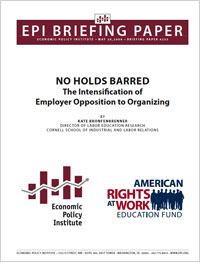This is an archive of news stories and research from the National Union of Public and General Employees. Please see our new site - https://nupge.ca - for the most current information.
Rise in firings, intimidation, coersion, threats, surveillance, retaliation and harassment demonstrate need for Employee Free Choice Act.
 Washington (22 May 2009) - A new five-year study reveals that private sector employer opposition to the efforts of American workers to form unions has intensified and become more punitive than in the past.
Washington (22 May 2009) - A new five-year study reveals that private sector employer opposition to the efforts of American workers to form unions has intensified and become more punitive than in the past.
There is little reason, with so many American companies operating north of the border, and corporate thinking so similar everywhere, to believe that employer attitudes vary much in Canada.
Conducted by renowned labour expert Kate Bronfenbrenner of Cornell University in Ithaca, N.Y., the study concludes that employers are more than twice as likely to use 10 or more tactics – including threats of firing and actual firings – in their campaigns to thwart workers’ organizing efforts.
Today’s anti-union activities include a greater focus than in the past on more coercive and punitive tactics designed to intensely monitor and punish union activity.
Study available online
In No Holds Barred: The Intensification of Employer Opposition to Organizing, published by the American Rights at Work Education Fund and the Economic Policy Institute, Bronfenbrenner provides a comprehensive, independent analysis of employer behavior in union representation elections supervised by the National Labor Relations Board (NLRB).
The report also compares employer behavior data during the study’s time period (1999-2003) to previous studies conducted by Bronfenbrenner’s research teams over the last 20 years.
The labour movement views the results of the study as further hard evidence of the need for passage of the Employee Free Choice Act (EMCA) now before Congress to restore the balance between workers and employers in the United States.
For the vast majority of workers who want unions today but do not have them, the right to organize and bargain collectively – free from coercion, intimidation, and retaliation – is at best a promise indefinitely deferred.
Thuggish attitudes common
According to Bronfenbrenner, it is standard practice – in union organizing campaigns – for workers to be subjected by corporations to threats, interrogation, harassment, surveillance, and retaliation for union activity. From the 1999-2003 data, the study found the following actions by employers:
- 63% interrogate workers in one-on-one meetings with their supervisors about support for the union.
- 54% threaten workers in such meetings.
- 57% threaten to close the worksite.
- 47% threaten to cut wages and benefits.
- 34% fire workers.
Even when workers succeed at forming a union, 52% remain still without a contract one year after they win the election, and 37% remain without a contract two years after the election.
At a briefing to unveil the results, Angel Warner, a worker with Rite Aid in California, trying to form a union and get a contract with the International Longshore and Warehouse Union (ILWA), said:
“We wanted to form a union so we would be treated with dignity and could speak up without fear of losing our jobs. Now we finally got through the harassment to form a union and we still don't have a contract. It shouldn't be like this. If my co-workers and I want a union, we should have one."
Bronfenbrenner’s study documents the increased use by employers of more punitive tactics such as plant closing threats and actual plant closings, discharges, harassment, disciplinary actions, surveillance, and alteration of benefits and working conditions.
'Carrots' less common
At the same time, employers are less likely to offer “carrots,” such as unscheduled raises, positive personnel changes, bribes, special favours, social events, promises of improvement, and employee involvement programs.
Private sector campaigns differ markedly from public sector ones, where 37% of workers belong to unions. Survey data from the public sector describes an atmosphere in which workers may organize relatively free from the kind of coercion, intimidation, and retaliation that so taints the election process in the private sector. Most of the states in the public sector sample have laws allowing workers to choose a union through the majority sign-up process.
According to the report, the failure of the current system to defend workers’ rights in a timely manner multiplies the obstacles workers face when seeking union representation, adding further delays that favour employers over workers.
Bronfenbrenner finds that employers appeal a high percentage of the cases and in the most egregious cases the employer can count on a final decision being delayed by three to five years.
Of the few cases in the representative sample studied where a penalty was imposed, the heaviest penalty an employer had to pay was back pay, minus the worker’s interim wages.
NUPGE
The National Union of Public and General Employees (NUPGE) is one of Canada's largest labour organizations with over 340,000 members. Our mission is to improve the lives of working families and to build a stronger Canada by ensuring our common wealth is used for the common good. NUPGE
More information:
